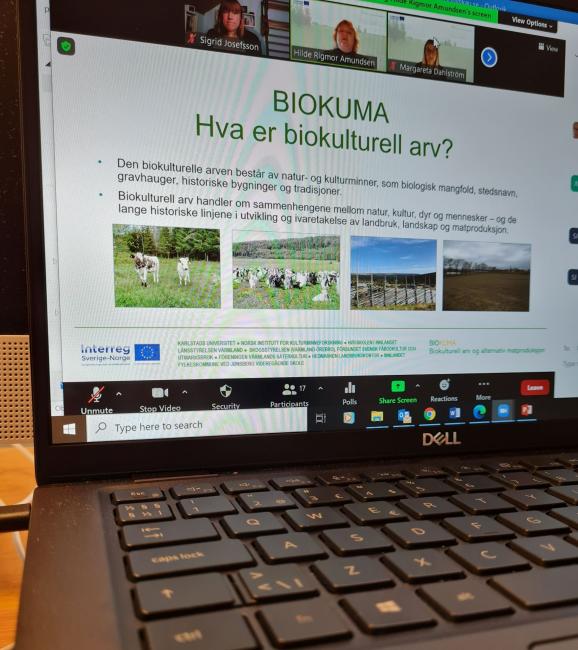Workshop on small-scale farms and sustainable farming: From how to navigate the jungle of bureaucracy, to mobile abattoirs.
2022-01-31A way of life characterised by hard work and a conviction that the food we eat needs to be produced in a way that is good for humans, animals and the planet for a long time to come. Running small-scale, sustainable farming has its challenges – and opportunities. In the first workshop organised by the project Biokuma, participants got to exchange experiences and ideas.
What was your first food memory? That was the opening question of the workshop held by the Biokuma project at the end of January. The workshop focused on biocultural heritage and alternative food production – challenges and opportunities in relation to landscape and production. The question took the participants down memory lane and stories were shared about early childhood memories, showing how important food is to us, especially from a sentimental perspective.
The participants at the workshop came from small farms in Hedmark (Norway) and Värmland, some grew vegetables and ran egg production, others raised livestock for meat production and produced field crops to feed the animals. The Swedish Forest Agency in Örebro-Värmland, the County Administrative Board in Värmland, Värmlands säterkultur and a representative from Norsk seterdrift also participated in the discussions.
- Earlier in the project, we visited some of the farms, did interviews and field studies, identified agricultural traces of past generations, what agriculture looks like today and how the cultural heritage can play a role in biodiversity, says Eva Svensson, project manager and Professor of Environmental Science at Karlstad University.
The interviews with the farmers formed the basis of the questions discussed in the workshop. The questions included, for example:
• Infrastructure: is there a dairy that can collect and refine the milk from the farm? Is there an abattoir nearby so that animals do not have to be transported long distances?
• Laws and bureaucracy: the need for better information and support to navigate information and regulations from the authorities
• Time: running a small-scale farm requires more work by hand. There is limited time to take leave. And who can take over when I retire or if I need to leave the farming?
• Forest work can be a source of conflict with forest owners and modern industrial forestry. How can we safeguard the future of forest work as a resource for biodiversity?
The workshop focused on possibilities. Ideas included, for example, how to increase knowledge about small-scale farms and conditions, create broader networks, the role of policies, mobile abattoirs, and the opportunities brought by the hospitality industry – from farm open days to farm shops.
There will be another workshop later this year with focus on education, knowledge transfer and sales outlets – from REKO-ringar (association with a digital platform that allows consumers to buy locally produced food and other goods without intermediaries) to Plockomater (small unstaffed shops with locally produced products).
Facts
The goal of the Biokuma project is to create better prerequisites for preservation and development of the biocultural heritage in the area by supporting alternative food producers as a form of trustees of biocultural heritage for the benefit of residents and visitors. The project is run by the Centre for Research on Sustainable Societal Transformation at Karlstad University and the Norwegian Institute for Cultural Heritage Research, as well as the Inland Norway University of Applied Sciences, with support from Interreg Sweden-Norway, the European Regional Development Fund, priority area Nature and Cultural Heritage. The project started in the autumn of 2020 and will finish in the autumn of 2022.


